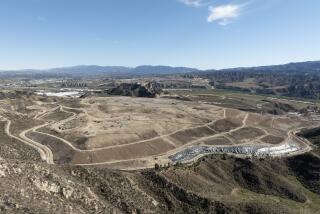Halt to L.A.’s Use of Scholl Landfill Urged
- Share via
Phasing out the dumping of trash from the city of Los Angeles at Glendale’s Scholl Canyon Landfill is among proposals being considered by Glendale to extend the life of its dump.
The proposal is contained in a city staff report that will be presented in an open study session Tuesday before the Glendale City Council.
While Glendale in 1979 turned over operation of the dump to the Los Angeles County Sanitation Districts, thus opening it to surrounding cities, the operation agreement will expire once the landfill accumulates 10 million tons of refuse. That is estimated to occur in about two years. At that time, the city can take back full control of the dump and exclude other cities if it desires.
Currently, about 442,000 tons of trash dumped annually at Scholl Canyon--about 40% of total deposits--come from Los Angeles, both by municipal and commercial carrier.
Glendale officials have long complained that Los Angeles has bowed to political pressures by closing the Mission Canyon Landfill in the Sepulveda Pass in 1982 before it was filled. Glendale also charges that Los Angeles has failed to find new sites and is threatening to close other landfills, thus forcing its trash to be sent to landfills in other cities, including Scholl.
The amount of refuse dumped at Scholl increased dramatically in the last year following the closure of Los Angeles’ Toyon Canyon Landfill, which had reached capacity, in Griffith Park.
City officials are uncertain about how much capacity remains at Scholl Canyon, which is operated by the Los Angeles County Sanitation Districts. A comprehensive county report on solid waste management for the cities of Glendale, Pasadena and Burbank is expected to be completed late this month, county officials said.
The Glendale City Council earlier this year planned to ban all trash collected in Los Angeles from coming to Glendale, beginning in October. But that proposal was dropped by the council after private commercial haulers complained that the ban would divert hundreds of tons of trash from Scholl Canyon to other landfills in the San Fernando Valley and cost customers great expense.
The council in September ordered the staff report on the future of the Scholl Canyon Landfill and ways to prolong its use. The study session will be held at 10:30 a.m. in the city manager’s conference room at Glendale City Hall.
Among other alternatives, the staff report recommends that dumping of trash from Los Angeles be phased out over a three-year period. Limits would be set annually on the amount of trash from Los Angeles that each hauler would be allowed to dump at Scholl. The limitations would affect about 250 commercial haulers who collect 390,000 tons of trash yearly in Los Angeles and deposit it at Scholl.
Kerry Morford, a Glendale public works executive who prepared the report, said private haulers complain that any restrictions on the use of Scholl Canyon will create a hardship for all refuse companies, particularly smaller ones. However, Morford said a three-year phase-out “would provide the necessary time” for private haulers to make “operational adjustments.” He suggested the city adopt a specific timetable for limitations.
Such limitations would have little impact on Los Angeles city, however, which dumps only 52,000 tons of municipal waste at Scholl yearly. Los Angeles officials said trash easily could be hauled to the city’s Lopez Canyon Landfill in Lake View Terrace. The majority of the trash from Los Angeles is brought by private haulers.
Another alternative proposed in the report recommends that use of Scholl be restricted to adjoining cities such as Pasadena, South Pasadena, La Canada Flintridge and nearby unincorporated communities. Currently, everyone can use Scholl Canyon.
In addition to phasing out Los Angeles’ trash, Glendale is considering imposing daily tonnage limits on users, similar to those imposed at two other landfills owned and operated by the county, the Puente Hills Landfill and the Spadra Landfill near Pomona. The report suggests that if the city imposes gradual decreases in limits, customers at Scholl “could be weaned from their dependence” on Glendale’s dump.
The city also could require that all users of Scholl implement recycling programs and undertake alternative waste-disposal practices to reduce the amount of trash dumped in landfills, according to the report. Glendale undertook an experimental city-sponsored, curb-side recycling program in October in a 24-block neighborhood and expects to expand the pilot program citywide next year.
Other alternatives propose composting plant materials to turn them into soil-enhancing fertilizers and grinding tree trimmings into wood chips to be used to fuel boilers. But experiments by other cities have found there is little demand for the products, according to the report.
Also to be explored at Tuesday’s study session is the potential use of waste-to-energy systems in which waste is burned in a process that generates energy. While such systems are controversial because of their effect on the environment, the process could reduce the amount of waste buried by as much as 45%.
Glendale Councilman Carl Raggio has called for more studies of that proposal, even though building such a system could take five years or more.
Since Glendale opened Scholl Canyon as a dump site in 1961, the amount of trash dumped there annually remained fairly constant for 15 years. But as other municipal and private dumps were filled and closed, more and more trash has been sent to Scholl.
Should the city decide to limit use of Scholl to Glendale exclusively, Morford said, the state might, through eminent domain, declare the landfill a regional waste-disposal site open to unrestricted public use.
He suggests, instead, that Glendale implement a variety of “reasonable and effective alternatives” to reduce the amount of trash dumped at Scholl.
More to Read
Sign up for Essential California
The most important California stories and recommendations in your inbox every morning.
You may occasionally receive promotional content from the Los Angeles Times.










